Shoe startups - and why Silicon Valley loves them so much
Silicon Valley companies for the last couple of years have been hard at work on inventing ways to sell us the same old things, only under a new sauce, with the prefix "innovative" and three times more expensive. Of the latest characteristic examples, the “revolutionary” idea of the Lyft Shuttle is about a large car that travels along a predetermined route so that many people can get into it at once, thus greatly reducing the cost of the trip. (This cool new innovation is called a “bus” in the rest of the world). Or the ingenious invention of the $ 100 Pause Pod , which can be installed in the office, to create in it a secluded corner and relax (known in wide circles as a "tent").

Would you pay a hundred dollars?
As TechCrunch noted in October, 2017 marked the end of an era of "those startups of two guys from the garage, armed with only burning eyes and an Idea." New Silicon Valley firms want to work quickly, widely and expensively. And most importantly - to collect more investment and pay good bonuses to the founders. Almost all ideas seem to float inside the economic and ideological bubble. And among these startups in recent years, many, surprisingly, are trying to invent shoes. Or at least new ways to sell it.
As Vagas Ali, the founder of one of the startups, says, “there is no way to hack shoes. You just have to do what people like to wear. ”
But this does not prevent people and businesses from trying. With variable success. Investments are the best talk about new trends. Over the previous year and a half, the Valley capitalists have invested more than $ 170 million in various “shoe” startups (instead of $ 90 for the period 2015-2016). It seems that if you have at least some idea of how to distinguish yourself in the market, at least a couple of hundred thousand dollars are provided for you. Moreover, investments are made in completely different projects, from trading platforms for second-hand shoe to a simple shop for kids. Startups are also experimenting with materials, trying to use everything from plastic bottles to merino wool. But why does Silicon Valley believe in shoes that way, giving money for all these experiments?
Take on growth
New active investments in shoe startups began literally in the last few years - after investors noticed the success of the shoe industry. It has slowly become one of the most expensive on the planet - and, unlike, for example, the development of smartphones, continues to grow. According to one of the latest reports , the global footwear market in 2017 is estimated at $ 246 billion, with 4.5% annual growth. Not as much as oil ($ 1.7 trillion) or fast food ($ 651 billion). But the sphere is developing rapidly, strong strong competitors are less here by an order of magnitude, and the entrance threshold seems much lower. Silicon geeks can not wait to grab yourself a tasty morsel from such a large shoe pie. Who knows, maybe if you pour enough money into a good startup, he will be able to crush the entire industry, as happened with Amazon?

In addition, shares of shoe companies do very well on the trading floors (even there is talk of a repetition of the 2008 crisis, so much "up" everything has been going on for the past few years). To many venture capitalists, this seems like an ideal time to invest their money. Shares of the most expensive "shoe" firm, Nike, have risen by more than 50% in the last 9 months, and now it costs about $ 130 billion. Smaller companies, like Adidas ($ 40 billion) and Puma ($ 7.5 billion), have the latest situation a couple of years is also very good. This makes investors more optimistic. “If we only grab a small share of users from Nike, we don’t have to do anything else!”
And finally, one more signal - Americans are beginning to spend more and more on shoes. Both women and men . On average, every American buys shoes for $ 300 a year - although a few years ago there was less than $ 200. And this means that there are more and more potential customers at startups selling expensive shoes with some kind of chips and gadgets. There was a whole generation of people who do not hesitate to give the extra fifty for some thing that is attractive specifically to them. And this is the most traditional idea of all “fast” startups: take what is selling so well and start selling it much more expensively, investing a couple of million in marketing. Suddenly shoot?
Atomic example
One of the last characteristic startups of such a simple configuration is Atoms . Take a look at their website. Doesn't it remind anyone? It's Apple, dear! Atoms advertising is also made in the style of Apple - clean and white, with a black and white product and its details, taken from different angles. This is not a coincidence: Atoms wants to become "Apple in the world of shoes, with the highest quality and most functional product on the market." The company has a lot of chips for this. The startup produces black minimalist sneakers without logos. With copper thread inside, which, according to the creators, cools the feet, destroys bacteria and prevents unpleasant odor. With quarter-sizes instead of half-sizes, so that the shoes fit exactly under the foot. And with a perforated insole to reduce its weight by a few grams.
The creators of the startup, a husband and wife, people from Pakistan, received $ 560,000 for the implementation of their ideas from Shrug Capital and the former top manager of LinkedIn Aatif Awan. They also went through the Y Combinator business incubator. Earn money going to "very loyal" customers. For starters, a startup sends users three pairs of their “atoms” in quarter-size (for example, if you say that you have 10.5 foot, you will be sent 10.25, 10.5 and 10.75) so that customers can try which ones they will be most comfortable with. in socks. Next, the company remembers the size you chose, and begins to turn you into its lifelong buyer.

Atoms is working on a special material for the insole, which is gradually erased under your weight. The idea is that people will send their old insoles, and the company will sell them the next pair with a discount. There are two advantages at once: first, the “insoles as a service” model is obtained, and even if the sneakers themselves are not yet worn out, the company will be able to get its own penny. Secondly, according to the degree of extrusion of different parts of the insole, Atoms will be able to more accurately understand the shape of the leg of its user, and improve the shape of the following models. For example, if she suddenly realizes that you have one leg slightly different from the other, the company will adjust the next pair of sneakers accordingly to make them more comfortable to wear (and the client is even more satisfied that he regularly pays $ 30 for a new insole).
But this is only in the plans. So far, the company has received its financing (according to rumors, already under $ 1.3 million) only on promises. Twitter users have been quite critical of the startup , calling it “an obvious scam” and resenting the price of “ordinary black sneakers” taken from nowhere (the company is going to sell its shoes for $ 169, instead of $ 100 for a similar model from Nike). Sending "atoms" to the first users was supposed to start at the end of June, but so far customers (about 4,000) have not received their shoes yet.
Sneakers in priority
The main category of footwear that interests both buyers and startups is sneakers and sneakers (in a word, sneakers). It is the growth of their popularity that has led to an increase in the average spending of Americans on shoes, and more than 80% of new “shoe” startups are somehow tied up with sneakers. The most successful of them in recent months has been GOAT - the marketplace for used sneakers (mostly rare and cool, for many hundreds of dollars). The company, founded in 2015, recently received a $ 60 million investment, and expects several more rounds of $ 25– $ 27 million. With this money, a new program was launched. According to it, the company itself now checks, cleans, photographs and stores the sneakers sent to it, while the buyer is still worth nothing. And if the shoes do not like it - you can return it, for free.
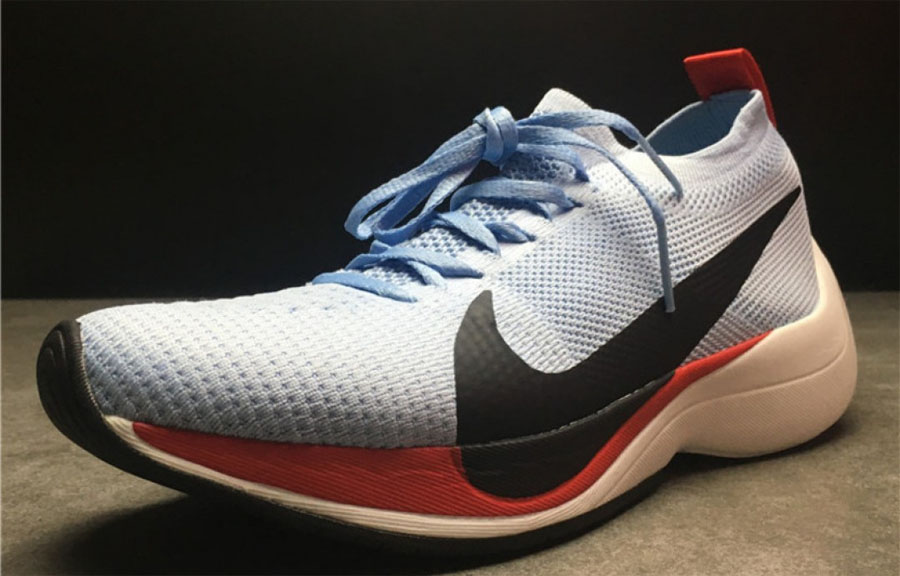
Nike Vaporfly shoes from our epic story
GOAT estimates the market for used sneakers at $ 1 billion, and this is its goal. Now the company has 8 million customers, 400 employees, 100 thousand sellers and 400 thousand sneakers on sale. According to the latest estimates, a startup can cost $ 250- $ 300 million.
The second most successful “sneaker” company that recently became interested in the valley’s capitalists is StockO , a direct competitor to GOAT. But if GOAT seeks to adopt the Amazon model, then StockX, rather, uses eBay practices. Here sneakers are put up for auction, and you can bet on them. The main "trick" of a startup - it works by analogy with the stock market. Sneakers are traded as stocks, they have their own indices, you can see how the price of various sneakers changed during the year. Some, as expected, fall two to three times as the hype around them subsides. Others, on the contrary, only addin the price - if the model has more fans than the sellers. Someone on such movements "shares" sneakers, according to rumors, earns very good money - just like ordinary brokers-traders.

StockX basically sells only real sneakers, only those that have never been worn, and only in the original packaging. For each transaction, the company takes from 8% to 9.5%. So far, the most expensive sneakers and pride of the entire stock exchange - Nike Air MAG 2016 with automatic lace (in the style of "Back to the Future"). According to rumors, they were made only 89 pairs. At StockX such sold nine pieces, priced at $ 24,000- $ 29,500.
Now, less than three years after its founding, the startup sells sneakers for $ 2 million per day (!) - and is still in an explosive growth phase. The company employs 370 employees, mostly checking whether the sneakers are real. Josh Luber, the creator of StockX, says that without problems even now he would have hired another 300, if somewhere he could quickly find so many people "versed in genuine shoes."
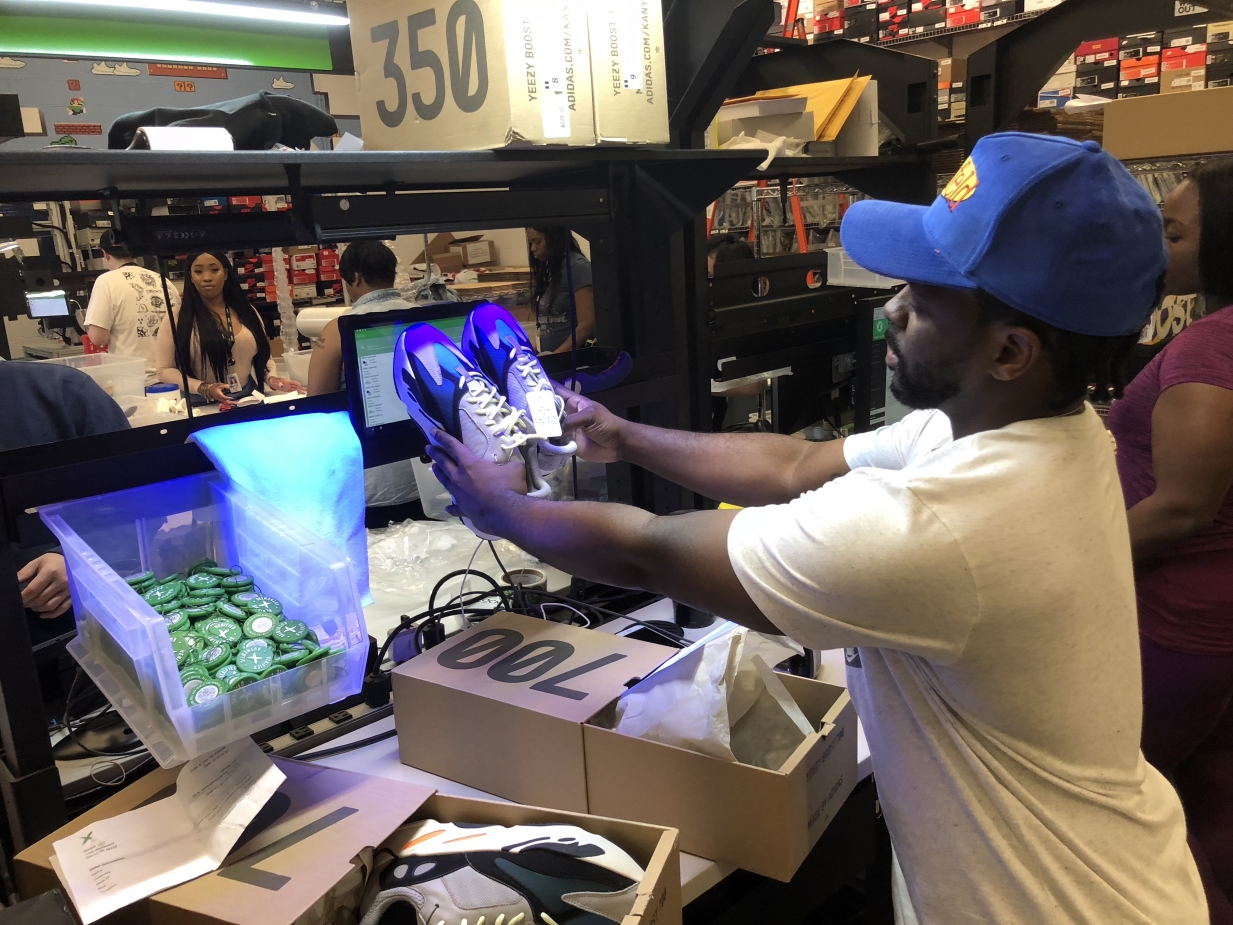
StockX employee checks sneakers under a UV lamp to make sure that it is not a fake
The explosive growth in sales of sneakers over the past couple of years is largely, experts say, based on changes in consumer sentiment among women. They do not order such expensive HYIP items from start-ups as young male fans. But still more and more women in the United States prefer to take sneakers instead of shoes with heels. They are largely responsible for the popularity of streetwear style - that is, not basketball, jogging or other sports models, but ordinary shoes, in which it is pleasant to walk along the city streets. GOAT and StockX say that women make up more than 30% of their audience, and this proportion is growing.
Ecology is more important than money
Venture investors also see potential in another category of shoe startups - companies associated with clean technologies. This trend in the valley began even before Ilon Mask, but now he is in full force, and many in the States agree to pay a little more to get shoes, which then will not decompose in a landfill for five hundred years, and will not kill any dolphins. The most famous startup offering such conditions to its customers is Allbirds . He makes sneakers from merino sheep wool (animals in the process, of course, do not suffer). The company promises that it has “the most comfortable shoes in the world,” while there is no plastic and other “unnatural” materials in it. A month ago, Allbirds also began to offer recycled eucalyptus fiber shoes.
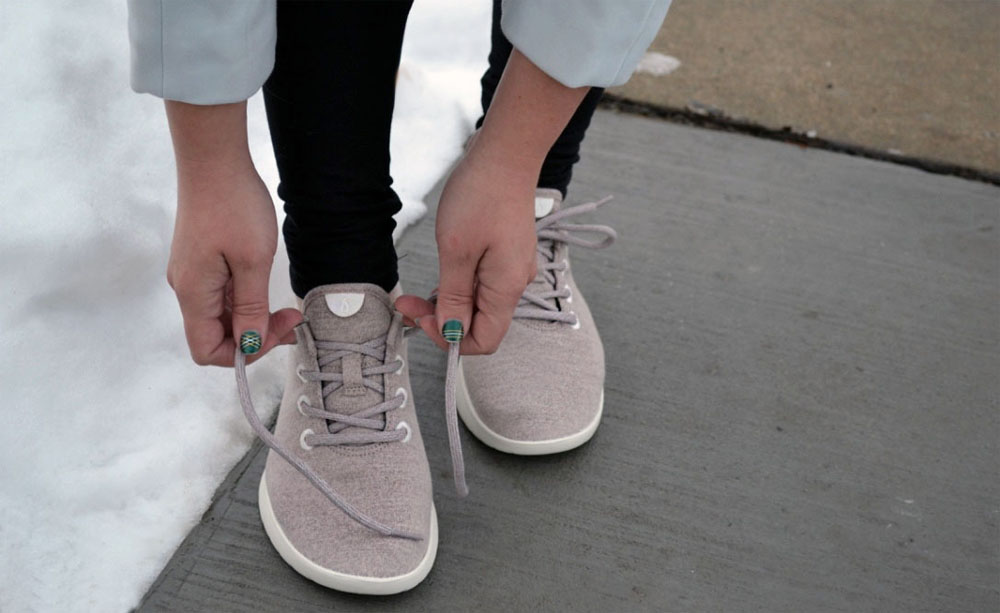
Allbirds
The startup received a $ 27.5 million investment, and is already recognized as successful. Tens of thousands of San Francisco geeks now go to Allbirds - although the company started just two years ago, in March 2016. All shoes are made in South Korea, and wool, they say, is used the same one that Armani orders for their expensive suits. Among the main reasons for the success of Allbirds are their price: instead of taking the exorbitant price for the "eco-friendly" tag, the company sells shoes for quite regular $ 95 for women / men and $ 55 for children.
In addition to Allbirds feel good Birdies . The name is similar, but the product is completely different (except that it is also eco-friendly). This startup develops and sells quite expensive slaps-slippers with pom-poms for women. Less than a year ago, $ 2 million was poured into it. By the standards of Xiaomi or Airbnb, this is a penny, but for an ordinary small factory that decided to try to open its online store, the money is quite substantial.
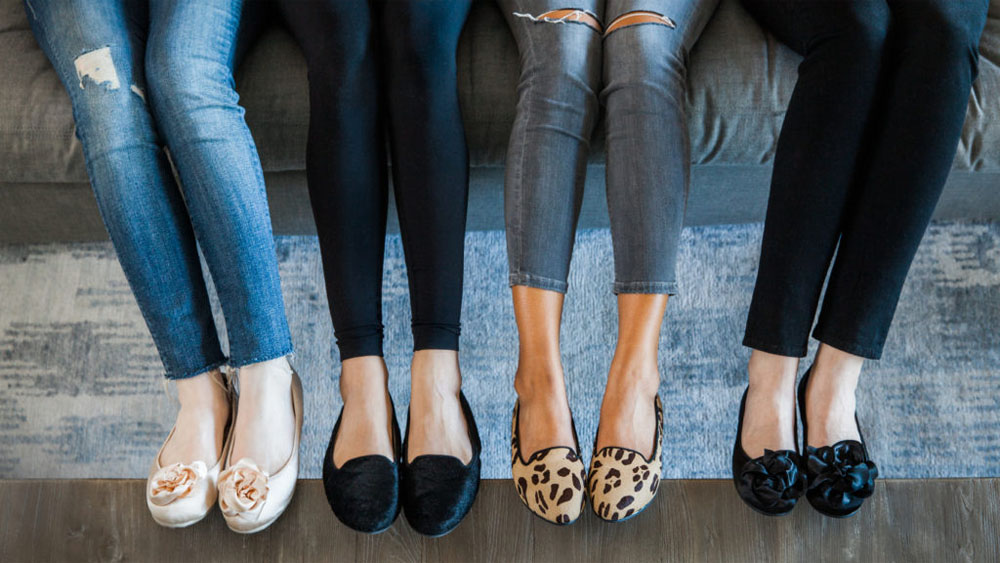
Birdies
Rothy's , which makes women's shoes out of recycled plastic bottles, received $ 7 million. They manage to make decent-looking shoes, but prices are not encouraging: $ 125- $ 165 per pair. Of the more “fashionable” startups, Tamara Mellon . He is only two years old, but he has already collected $ 40 million from investors - due to the fame of his creator, Tamara Mellon, designer and editor of various fashion magazines. The fact that she was “thrown” by so many millions is blown up by the fact that her previous brand (also Tamara Mellon), founded in 2013, went bankrupt in 2015, after a long dispute with investors. But, apparently, as long as there is enough money in a bubble, you can step on the rake as much as you like.
Smart shoes?
Several startups have already (inevitably) released smart sneakers. Of these, the first and most famous is Altra Running (from Russia, perhaps, it comes only via VPN). They are rumored to have spent about $ 30 million on the development of their model of sneakers Torin IQ . The company has turned out "the world's first smart shoes that trains you."
Sensors are integrated into the sole and fabric on the sides of the sneakers, sending information to the Altra IQ application on the smartphone. They suggest what kind of stress your legs feel while running. If some parts of the foot get disproportionately large loads, the system prompts the athlete to pay more attention to it or change his running technique. All this happens in real time. The idea is that the person should run with the headphones connected, and the application gives him recommendations while running (and “motivates” him by acting as a trainer). When the run is over, an analysis of how you ran and how much your running technique has improved since the previous time is shown there.
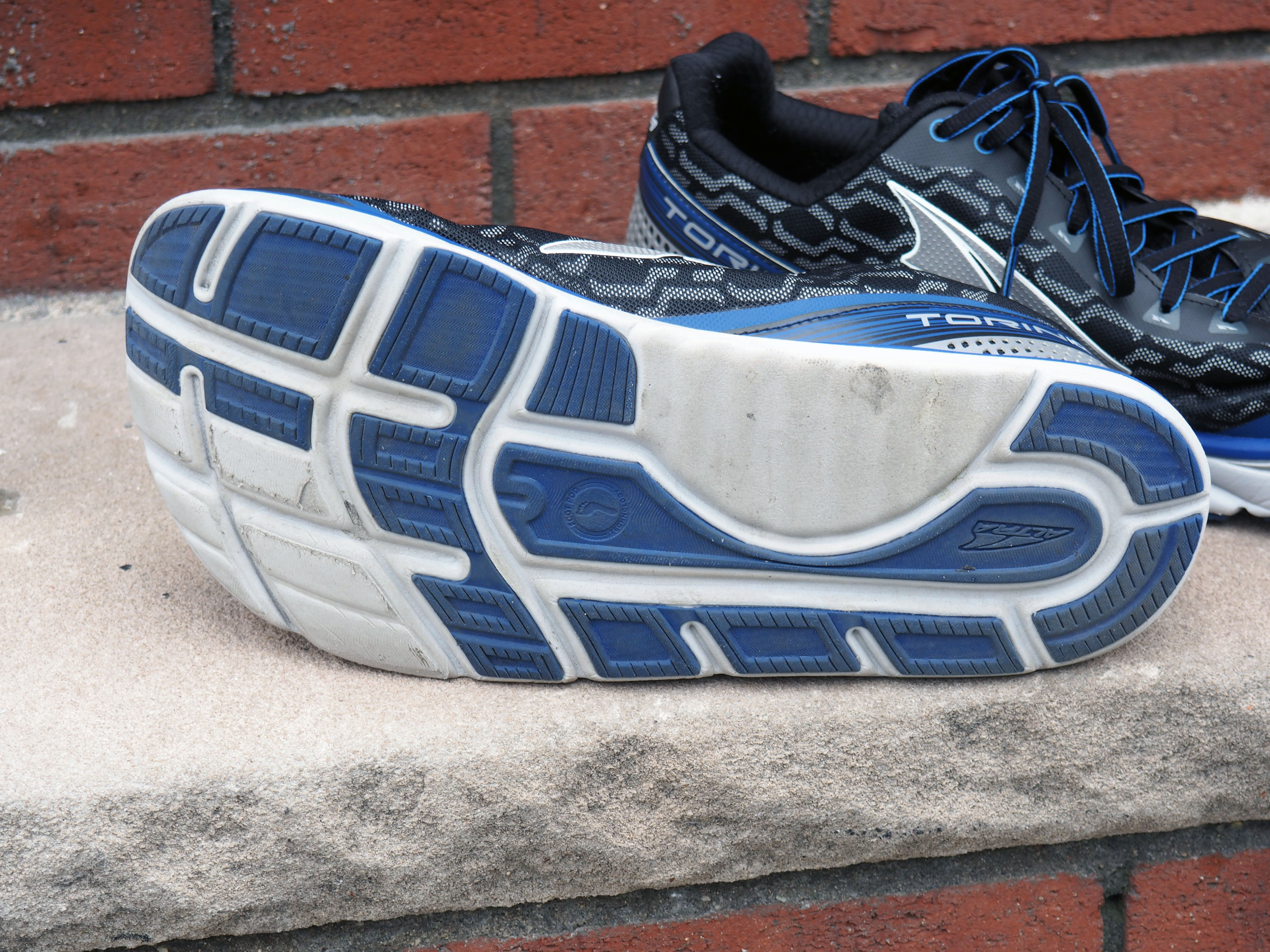
Torin iq
Smart shoes cost $ 200 - almost $ 100 more than the usual “stupid” Torin models from the same company. Torin IQ was released over a year ago, and the feedback on it is mostly positive, but there are few buyers. Maybe not many people want the car in their ear to tell them how to run correctly?
Return investment
Recent stories show that, thanks to the growth of the market, investors can quite successfully get out of shoe startups, having multiplied their capital several times. GOAT and StockX are already making good profits, although they continue to attract investment, intending to expand to Europe and Asia. But there are less rosy stories.
One of the last failures was the bankruptcy of Shoes.com. Its founder, Roger Hardy, professionally engaged in the creation and sale of startups. The last of these, Coastal.com’s contact lenses, was sold for $ 450 million, so investors in Silicon Valley immediately sent him and his partner, Sean Clark, $ 70 million in response to his request for a shoe startup. In 2016, the company quickly gained $ 176 million a year and was even going to compete with Zappos. And, of course, bought a very cool and relevant name for your site.
But it turned out that Zappos and Amazon would not give up their customers so easily. With their delivery time and customer support, new Shoes.com could not compete, but it did not have its own “chips”. Already in January 2017, the company unexpectedly declared bankruptcy. Thousands of customers who made orders on the site on the last day of its existence did not receive either money or sneakers (some of them, unfortunately, worked through us). Now at the same address is already a completely different company (formerly Shoebuy). Hardy and Clark are suing, including Wells Fargo, but they only have debts from the property, and the domain name turned out to be the most valuable asset of the company.
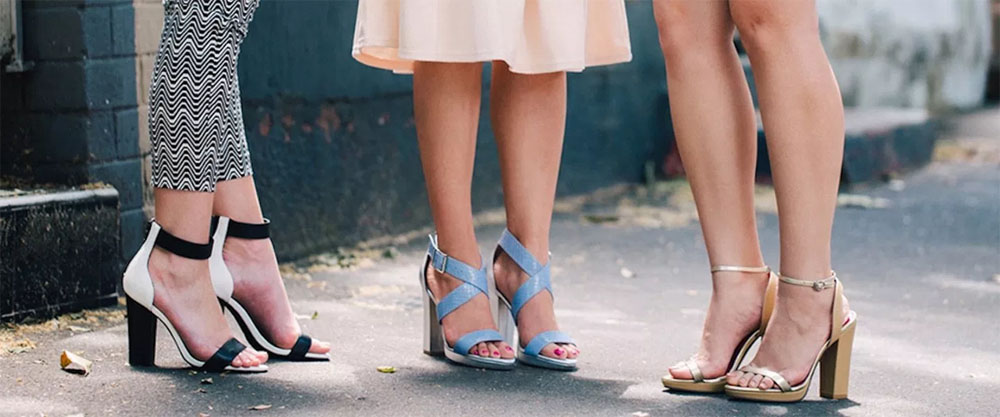
Shoes of Prey
It seems that soon the same tragic fate will befall Shoes of Prey , a startup offering custom shoes for women that exactly fit the size of their feet, including the width. The company received $ 30 million in 2015-2016, but recently was forced to announce the collection of another $ 3 million, so as not to stop operations. It turns out that every year a startup loses $ 7 million, and now its “optimistic” strategy is that it will make a profit in 2021st. If you hold out.
The future of Allbirds, Birdies, Rothy's, Altra, and especially Atoms is so far foggy. It is only clear that if they report on the collection of new investments, there will be money for them.
P.S. Мы в Pochtoy.com доставляем в страны СНГ обувь, одежду и гаджеты из магазинов США. От $8,99 за полкилограмма. А если зарегистрироваться у нас с кодом Geektimes, на ваш счет сразу зачисляется $7.
